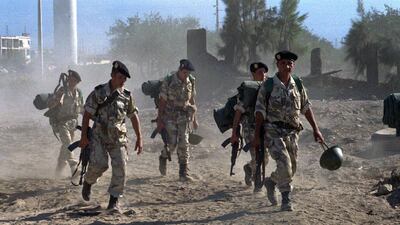Algerian government forces are hunting down the remnants of a decades-long insurgency in remote rural areas.
But analysts do not believe extremists have been able to exploit a protest movement that gripped the country from February 2019, until it faded during the peak of the Covid-19 pandemic.
Four terrorists suspected of being linked to Al Qaeda were killed during initial clashes on Saturday, when detachments of the National People's Army (ANP) encountered the group.
Two officers, a corporal and a sergeant, were also killed during the exchange of fire. A further clash occurred the following day, involving the death of two alleged terrorists and a soldier. Firearms, explosives and ammunition were seized by the ANP.
The weekend's fighting is the latest in a long running, low intensity conflict that has become a fixture in the lives of many living within Algeria's hinterlands.
Three alleged terrorists were shot, along with one soldier, in Jijel in north-east Algeria during the first week of December. Later that month, a young Tunisian shepherd was captured and beheaded within the mountains spanning Tunisia and Algeria, by terrorists thought to be allied to ISIS.
According to the Algerian Ministry of Defence, 21 alleged terrorists were killed during 2020 as part of an intermittent campaign that can be traced back to the country's brutal civil war of the 1990s.
During that decade, between 1992 and 2002, an estimated 200,000 people were thought to have been killed in bitter fighting between the army and various groups, though final figures remain disputed.
Despite the slaughter of the Tunisian shepherd, ISIS remains a relatively minor presence within Algeria, having failed to establish any permanent presence within the country, only maintaining a cluster of fighters in north-east Algeria and within the area around Constantine.
In contrast, the militant group, Al Qaeda in the Islamic Maghreb (Aqim), to which the Algerian extremist Abu Ubaidah Yusef Al Annabi was named leader in November 2020, remains a prominent presence.
Nonetheless, despite the lethal nature of such groups, the majority of attacks involve ill-equipped fighters eking out an austere existence within the rugged hinterlands.
Fighting the long war
Rather than mark any dramatic departure from past operations, clashes such as those seen at the weekend remain relatively commonplace within Algeria, Ludovico Carlino, Principal Analyst for the Middle East and North Africa team at IHS Markit told The National.
"However, I think that the appointment of Abu Ubaidah Yusef might have played a role here. The new Aqim emir is Algerian (from Annaba), and it is entirely possible that Aqim will seek to increase its profile in Algeria by staging further operations in the country," Mr Carlino said.
In recent years the ANP was successful in battling groups including Aqim, pushing it back to Mali, Niger, Libya and towards the Sahel, which is now Aqim’s centre of operations, Mr Carlino said.
Nevertheless, the recent designation of an Algerian as emir may mark a new direction for the group.
"The appointment of Abu Ubaidah Yusef might slightly change this, with the group keen to prove its relevance in Algeria as well and opportunistically attempting to exploit the social discontent that seems regaining ground in the country," he said.
Algeria's underlying social discontent found its most vocal expression during the series of mass protests, or hirak, that all but brought the government to its knees before the pandemic halted large-scale protests in March of 2020.
For a little over a year, Algerians in their hundreds of thousands took to the streets every Friday to demonstrate against government corruption and economic stagnation. While Islamist efforts to infiltrate the protest movements were consistently rejected by predominantly secular demonstrators, extremists may still harbour ambitions of exploiting popular discontent.

